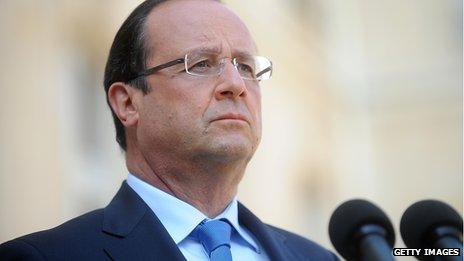Syria crisis: Emboldened France seeks action
- Published
- comments

French President Francois Hollande does not need to consult parliament on a military intervention in Syria unless it lasts longer than four months
President Hollande of France said that the vote by the UK Parliament would not affect France's will to act.
He supported "firm" punitive action over an attack which had caused "irreparable" harm to the Syrian people. When asked if France could act against Syria without Britain he said: "Yes. Each country is sovereign to participate or not."
History teaches countries different lessons. In 2003, France and Germany were pilloried in parts of the American media for their opposition to invading Iraq.
One New York paper replaced the faces of their representatives at the UN with pictures of weasels. The Security Council was renamed "the Council of Weasels". On some menus French fries were rebranded "freedom fries".
The Iraq war came and in its chaotic and violent aftermath France and Germany felt justified. In the UK, the intervention in Iraq has sown mistrust in intelligence briefings and has undermined the appetite for military action.
As British Prime Minister David Cameron said in parliament, "the well of public opinion has been well and truly poisoned by the Iraqi episode".
France, on the other hand, has become emboldened if the moral case for action is strong. After the chemical attack, it was the French Foreign Minister Laurent Fabius who first raised the possibility of "force" against Assad's regime.
"The only option that is not on the table is to do nothing," he said.
President Francois Hollande did not hesitate in sending forces to Mali when Islamist groups threatened the state.
His predecessor Nicolas Sarkozy - urged on by the philosopher Bernard-Henry Levy - became the leading advocate for action in Libya. He said the country had a moral imperative to prevent Gaddafi's forces from attacking Benghazi.
UK on the sidelines
Although there is no public enthusiasm for military action against Syria, the polls in France are interesting. Somewhere between 45% and 55% of the French people favour punishing Assad.
The strongest opponents of military action are the far right. The Socialists are the most enthusiastic supporters because they believe there is a moral duty to act if chemical weapons have been used against civilians.
With the British parliament having voted against any military involvement over Syria, attention focuses on France. Defence Minister Jean-Yves Le Drian says French military forces "have been put in a position to respond".
The coming days could see the American military acting in alliance with the French military with the UK on the sidelines. Britain's so-called special relationship with the US will not be the same.
Yet it is still not clear whether President Hollande will actually order French forces to join an American attack. As president he does not need to consult Parliament unless any military action lasts longer than four months.
He spoke to Angela Merkel on Thursday. They agreed there had to be a reaction to last week's attack in the Damascus district of Ghouta - but what exactly that response should be remains unclear.
Both Paris and Berlin put store by waiting for the UN to deliver its report on what happened even though the inspectors will not attempt to apportion blame. That report will not be ready until Sunday.
The French President says "everything must be done to reach a political solution" and has been urging the Syrian opposition to become a credible force.
What the French - and I think the Germans - favour is not just to punish Damascus for its alleged use of chemical weapons but to try to muscle it towards agreeing to attend talks in Geneva.
That is the goal for the Europeans - to get Russian President Vladimir Putin to push Syria's Bashar al-Assad towards talks, but that will only happen if Mr Assad feels vulnerable.
President Hollande seems committed to a tough response but if he was to baulk at being the only European power to join in any military action the Americans may go it alone.
President Barack Obama's officials have said that he would continue to consult but make decisions "in the best interests of the US". Another official says the president believes "there are core interests at stake for the US".
If America acts alone, it will once again re-open the question of what Europe stands for. Syria lies just a hundred miles from the border of an EU country.
The Obama administration believes that it is necessary to punish and deter Assad. The only question is whether Europe - represented by France - will be with them.